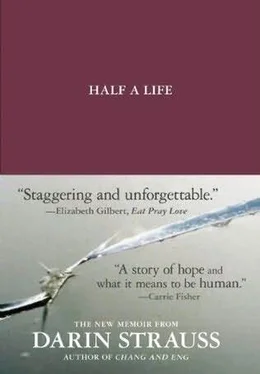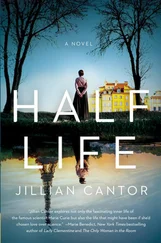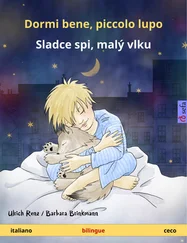I had waited a long time, knowingly or not, for this moment. Things seemed to be falling away between Susannah and me.
“Well,” I said.
This all must read as communicative impotence. But because of my shared perspective with her, and all the couple-impressions we’d logged — all our new knowing — I’d gained a kind of microtonal purchase on hearing that “well” of Susannah’s, just as I bet she had on mine. Hers carried two meanings, I thought: If you choose not to try therapy, I’ll still be here for you — but you have to recognize that it isn’t your issue alone anymore . All this felt approximate and submarine, as if we’d both gone deep into the tide of this moment. It was a larger and more complete moment than simply the words that were like whitecaps on the surface of it. All moments are like that. But the rare thing is to have a clear sense of this depth, and to know another person is sensing it, too. Susannah now gave a resolute, palms-up hand gesture that meant, I thought, even more supra-lingual stuff — something about her character, about her manners and doggedness. (The message of my “well” was simple: Sorry for having been a jerk a minute ago.)
“When I figure out what I think and feel about all this,” I told her, “I’ll talk about it with you.”
She brought that gesturing palm to my cheek.
“Anyway, I think I’m getting there,” I said. Susannah said okay. Her hand slipped from my face. We went back to bed. That was it.
In fiction classes — or in the novelist-as-humble-cobbler image, writing workshops —you find that epiphany has a pretty high rate of occurrence. It’s a story, it’s tidy. At the end, the hero finds himself standing under just the right tree, reaches up without quite meaning to, and plucks down just the right fruit.
But when you tell your own story honestly, that epiphany thing is rare: there is no walk, there is no fated grab. You try every fruit, or forget there even are trees, and wander from forest to forest, losing sight of any destination. The only changes are emergencies or blessings: when you wake up, notice the surroundings, then fall back, and wander more. And if you’re lucky you end up walking again through a life where you’re never called on to do too much noticing.
So there isn’t any single moment I can point to that scored when I began to feel better . I think my job here is simply to dredge it all up, to offer a lumpily dutiful telling of my own life. This is what guilt is like, this is what grief is like, this is how a life forms: when you can’t ignore, when it wraps itself around one event like a vine clutching a rock. Every direction the vine takes will be determined by that stone. The growth is what you see. But if you look farther down, what you find is the rock.
There were times, in the middle of the night, when I’d come awake and wonder which of us would die first. Cold air above the humidity of the bed, Susannah’s mouth open and fishily helpless next to mine, and I’d think: Me . Maybe this was more than a trick of the mind. Maybe this was Celine. Celine with me, her words hard, posthumous, and clear: You, Darin— you are going to die first.
I got through my twenties and early thirties only by relying on one thought as hard as I could: Celine had committed suicide. She’d committed suicide through me. I was no more responsible than is the bullet that comes out of the chamber. Etc.
Without those blinders — and the thought was a blinder; it allowed me to move her parents, her funeral, what I’d been thinking about in the car the second before I encountered her body, out of the frame — without those blinders I wouldn’t have made it.
That certainty got me through the first ten years. I nurtured the idea, watered it, saw it ripen, stared at it. Wherever I was, I could summon it.
There are different brands of ignorance: the static of perplexity, the spun silk of denial. People are too hard on denial. Shrinks have theories to confirm, patients to command into the breach. But a person has only a problem, a souvenir, a life to shoulder through. We need to tell ourselves whatever is necessary. I do think real analysis would have let in unsafe doubts too soon, like unlatching the great wooden horse and then just standing aside as all the sandals and swords ambled past.
My talk with Susannah, with its little aha— Hey, I’ve started to think about the crash a lot less often than I had been! What does that mean? — allowed the truth to begin taking on more shape than I could have handled before. Okay, why? It is worth considering why. The accident and its aftermath became not simply mine but part of the relationship. Celine was a way we communicated. What a horrible fate for a ghost. She was absorbed into the thousands of things that were part of us. Once upon a time, this was what I’d wanted to do with those two unfamiliar girls on the median strip, and also in front of my classmates at graduation. I’d gotten Susannah to see the crash as the most dramatic and basic part of me — which it had been, but maybe wasn’t any longer. And, certainly, I had tortured myself for feeling nothing special about it (because the official moments of grief handed me not my own emotions, but something fixed and sanctioned, and what I mainly felt was guilt about that). All the same, this awfulness remained part of who I was. And now who I was had become part of who Susannah was. The crash was no longer something that made me half a person.
That’s why I went ahead and did it. I finally got my bravery up, I finally looked hard through the window of memory, a neat square cut into the years.
The timing of my decision to write at last about Celine wasn’t a fluke. There was a starting gun, composed of two barrels: new fatherhood and the calendar. I was thirty-six when Susannah became pregnant with twin boys. In early 2007, children of my own were on their way, and the accident had happened exactly half my life ago. (And if you lopped off the first few years, because one isn’t really quite there as an infant, it was more than half my life.)
These are the type of holy cow— grade changes that open a new passageway in one’s thinking.
I’d written three novels without laying a hand on the subject. I’d talked to interviewers, posed looking silly in magazines. My first book cropped up on bookshelves as I was turning thirty, and I wondered if the Zilkes noticed — if Mrs. Zilke thought it was enough. First novel about twins (one dies, the other can’t go on living); second novel about a guy who’s a con artist, a fraud, and an impostor all at once; most recent novel about a marriage where the truest thing between the couple never gets spoken. Historical and contemporary, first-person and third-, different fictional stories chiseled from the same real story. But was I pushing myself enough, succeeding enough for Celine and me both, for our two lives?
My moral and aesthetic codes argued against my writing an accident memoir, against my becoming one more person creating an entertainment out of misfortune, distilling honey from vinegar.
“Yes, that’s a valid consideration,” Susannah said. “On top of which, do you really want to publish something so personal?”
In all this time, I had never heard anything from the Zilkes; the last time I saw either of them had been Mr. Zilke in the courtroom. When I remembered him, it was always as a father offering iced tea and a coaster.
“I just feel like I have to, Sus,” I said. And merely having said it brought the buzz of certain decision.
“Okay,” Susannah said.
And she kissed me on the cheek — for a beat too long — before leaving the room.
But months passed and I still hadn’t made the jump. Instead I published the novel I’d been working on, Susannah and I bought and fixed up a house, we gathered all our stuff and moved in. I was living out a montage of decisions and their upshots — this could have been one of the lives I’d picked for Celine. I took a faculty job at New York University, and Susannah gave birth to our children.
Читать дальше









